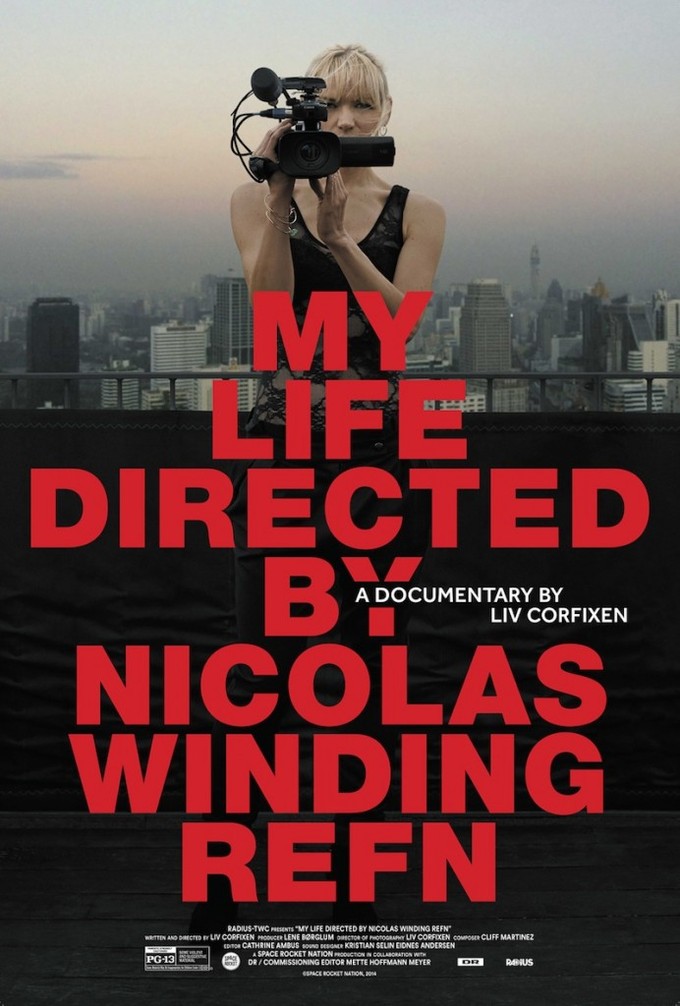
If you just went on his output, you wouldn’t be blamed for thinking that Nicolas Winding Refn is a broody, inscrutable guy, a walking ball of intensity and artistic ambition with a dark side plastered all over his face. Untrue.
In fact, Refn, the director of films like DRIVE, the PUSHER trilogy, BRONSON, and VALHALLA RISING, is a complicated, but genial guy, who was just as affected by the positive reception of DRIVE as he was the open hostility bestowed upon his follow-up, ONLY GOD FORGIVES. During the production of that film, he tried to disconnect with what both the public and critics expected from him, but he was deeply concerned about not squandering the goodwill he’d amassed with that first collaboration with Ryan Gosling.
His wife, actress/filmmaker Liv Corfixen, decided to shlep her two young daughters and move to the film’s Bangkok location for the duration of the shoot. While there, she documented both Refn’s process and the impact the production had on their family life. That documentary is now being released (it is playing tonight through Thursday at Cinefamily here in Los Angeles and Lincoln Center in NYC), and it’s a great look at the realities of contemporary filmmaking, the toll an artistic career takes on sustaining a marriage, and the idiosyncracies of Mr. Refn himself.
I found the film incredibly entertaining and enlightening when I saw it at Beyond Fest in October, so I was honored that Mr. Refn and Ms. Corfixen allowed me to sit with them and chat about their marriage, their artistic ambitions, and the struggles of making art in a commercial medium:
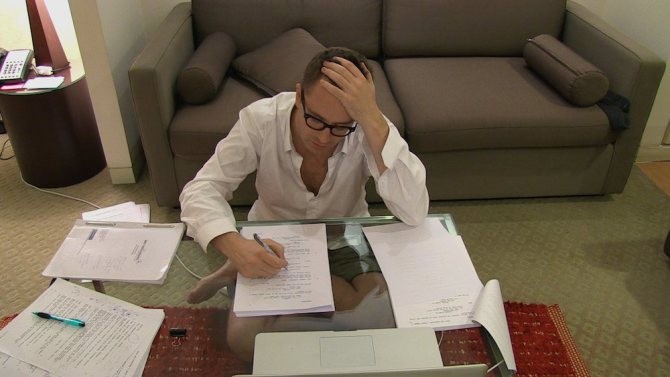
VINYARD: Liv, why exactly did you decide to start filming your husband? I mean obviously he’s made a bunch of movies and you never-
CORFIXEN: Filmed him before?
VINYARD: Yes, exactly. What was it about this time that inspired you to do this?
CORFIXEN: I think it was because the other times, when he made the other movies, I stayed in Denmark, so I sort of had my life going there, and my work, and my children. This time, we decided to go to Bangkok with him, so I had nothing to do for six months besides, you know, taking care of kids and being a housewife, which I find a bit boring if I do it for a long time. So the idea just came up after we’d been there a month, so I could work too.
VINYARD: Why did you decide to go along on location this time?
CORFIXEN: To Bangkok?
VINYARD: To Bangkok, yeah.
CORFIXEN: Honestly, it was because when Nicolas did DRIVE, he was living in L.A. for 10 months, and I was stuck in Denmark with two children, going back and forth and everything. It was just too tough on the whole family. We missed each other, so I said, “Next time, I’m just going to join you, and put the girls in schools and all that.”
VINYARD: How long did you guys spend in Bangkok?
REFN: We were there six months, which is pretty tough because of the climate and that whole situation. It was great fun.
VINYARD: You were there in the summer?
REFN: We were there September 1st-
CORFIXEN: October 1st, I think.
REFN: October 1st-
CORFIXEN: And then six months.
REFN: Yeah, then six months later, like May, we went back in May. Like the hottest time of the year.
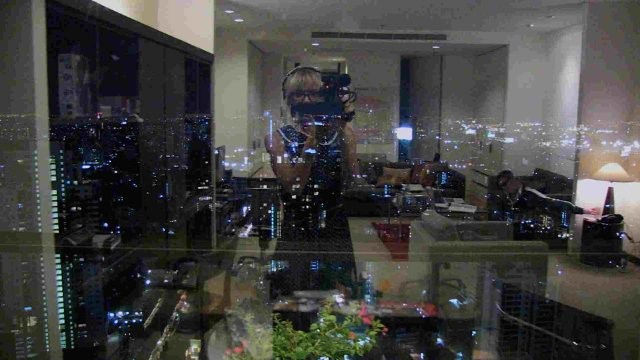
VINYARD: Oh yeah? Well, it’s a very revealing documentary, and it’s very intimate. It’s very much about your family life. Was there ever concern about showing something, or even capturing something, on camera that was that personal to you? And why the decision to exhibit that?
CORFIXEN: Not really, because I thought if I should do a documentary, I should make it personal and interesting. I think that if I just made a movie that was more about his work, and only a behind-the-scenes kind of movie, it would be a little boring, because it’d be interviews with actors praising Nicolas and saying how great he is.
REFN: Which there’s nothing wrong with…
CORFIXEN: But I thought it’d be more interesting to show the downside-
REFN: Of your life.
CORFIXEN: Of my life, and how hard it is sometimes to be with an artist.
REFN: She says it’s about me, it’s really about her.
VINYARD: You’re an active presence behind the camera, but it’s mostly about you Nicolas.
REFN: It’s about her.
CORFIXEN: No it’s not. It’s about us. And you.
VINYARD: But (to Nicolas) you’re the one on camera. Was there ever any tension or nervousness that it would have an impact on your creativity or your spontaneity?
REFN: No. About six, nine, years ago is GAMBLER?
CORFIXEN: It’s ten years ago, iI think.
REFN: Ten years ago, we were the subject of a feature documentary, so we kinda tried it before. I guess we were used to it, and for me, personally, it was just like, whatever. In a way, I think my attitude was like, “If you’re gonna make it, go all the way.” Why? That’s the only way that’s gonna make it interesting. The last thing anyone wants to see is how fun it is to create something. Everyone knows that it’s fun, but there’s a whole different reality that you base everything in, which is all the pain, and the worrying, and domestic problems that you go through. Essentially, that’s where it’s all happening.
VINYARD: The saying is that the sets where they have the best time make the worst movies. You want a little bit of tension.
REFN: Oh, yeah.
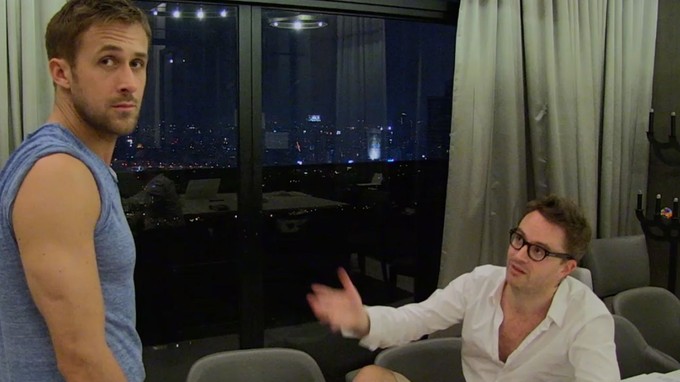
VINYARD: The music is obviously a huge part of both of your films, and Cliff Martinez did the score for the documentary as well. How’d you present the project to him?
CORFIXEN: Um, I think Nicolas actually mentioned that he thought I should ask, and I was like, “No! That’s out of my league! I can’t ask him,” and he was like, “Why not! Just ask him!” And then I did, and he was like “Yes. I want to do anything with Nicolas.” And he was so nice, he’s such a nice man. He’s so easy to work with, and it was such an experience. I just felt very lucky.
VINYARD: Had you ever done a documentary before?
CORFIXEN: No. This was my first time. I tried to do one a few times, but I got pregnant every time, and was sick and nauseous, so I gave up my project every time. I was an actress before, but I grew up with my parents who were filmmakers.
VINYARD: Sure, your father was a cinematographer (by the name of Teit Jorgensen), so you grew up around cameras.
CORFIXEN: Yeah, and my mother was an editor.
VINYARD: Were you guys already married when GAMBLER was being made?
REFN: We’d been together for seven, eight years.
CORFIXEN: We weren’t married, but we were together.
REFN: We were not married, but we’d been together for years.
CORFIXEN: We’ve been together for 19 years now.
VINYARD: Wow.
REFN: We really only just got married ‘cause of taxes.
VINYARD: I understand.
REFN: Great way to get married.
VINYARD: Oh yeah, great reason, great excuse. What was the difference between shooting GAMBLER after- it was after the production of FEAR X?
REFN: Yeah, dealing with my bankruptcy and all that.
VINYARD: You were going through a lot in this movie, but I guess it wasn’t as hard time as it was the first time around.
REFN: No, it’s just hard in a different way. The process of…when you know something worked, in the case of DRIVE, knowing that you didn’t have to destroy everything because you wanted to make something new, it’s a tough freefall to be in. To create something new, you have to erase the past, or else you’ll just repeat yourself, so every time it’s the same process. You destroy everything you’ve built for something different, and that’s not always easy. Especially when you know the consequences.
VINYARD: In this case, what do you think the consequences were, and what’d you think they could be?
REFN: I think that when you make something that a lot of people liked very much, knowing that you’re going to make something completely different from that, you have already…it’s like the fear of not being… that people won’t react to it.
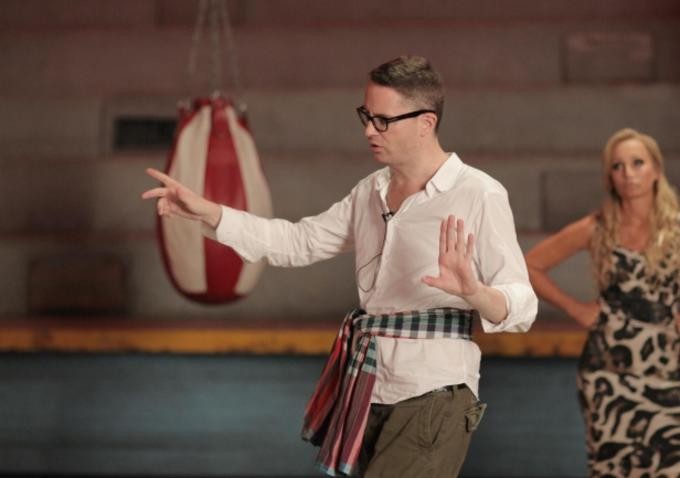
VINYARD: You’re shooting your next film, NEON DEMON, in L.A., is that true?
REFN: Yes.
VINYARD: So it is safe to say that now, you’re more comfortable revisiting or building on what you started with DRIVE?
REFN: No.
CORFIXEN: Oh, no. It’s the same all over again. It’s the same every time. It’s like new anxieties, new problems.
REFN: It’s never easy. It starts again, being difficult, and you say, “Okay, what I did last time, I have to forget now, and have to pretend like I’m making a second movie away from the first movie, so I have to make it different. It’s been like Lou Reed going from Transformer to Metal Machine (Music). Made one of the great rock albums, and then did Metal Machine because by doing Metal Machine, he erased all the expectations and the joy that people had so he could make something completely new.
VINYARD: After FEAR X, you returned to the PUSHER series with PUSHER II and III. Would you ever do a sequel to another one of your films?
REFN: I’d like to avoid it, but that’s what I said when I was younger, and look what happened.
VINYARD: Was it because of the troubles on FEAR X that motivated you to revisit-
REFN: I had no money. After that movie, I had collapsed financially, I owed my bank a million dollars, we had nothing. This woman decided to document our lives, who was a very good documentarian, and in a way it was very therapeutic. You see your life in a different way. It’s almost like it’s not really reality anymore.
VINYARD: In a way it’s not reality, because it’s edited to match someone’s vision, but I”m sure it grants some level of perspective just seeing yourself.
REFN: It’s almost like you turn something bad into something good for someone else, and it makes you feel better.
VINYARD: Other than the financial aspect, what was the experience of making FEAR X, your first English-language movie?
REFN: It was a failure all around. I, at a very young age, experienced total, utter failure. But if it wasn’t for that failure, I wouldn’t have done all the other movies, so i was meant just to try that, and I’m happy I tried it at an earlier age, because it’s not easy to fight your way out of all those problems. Especially financially.
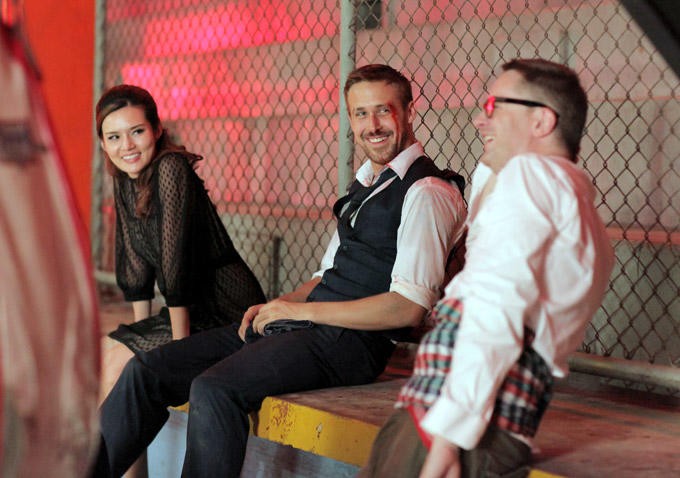
VINYARD: And critically. That’s also something that (Liv’s) film deals with, your relationship with critics and how critics perceive your work. I was wondering could both of you talk about your relationships with critics, and the idea of reading your own reviews and how that affects you and what you want from it?
REFN: (to Liv) Well, you can start. It’s your first time trying it.
CORFIXEN: I tried when I was an actress. I never really worried so much about critics. I don’t know if it’s because we live in a small country. I feel like it’s one person’s opinion in a way. I don’t see a movie, or a play, or an exhibition because of critics, because of a review. I do it because I want to, or if my friends think I should.
REFN: But your life is going to change, because now everyone is critiquing you around the world!
CORFIXEN: No, Nicolas is very different because he cares a lot about, you know, the money, does it earn the money back, and all that. I guess if i’m satisfied, it’s fine with me. I really don’t care if someone doesn’t like it. I don’t know, maybe it’s dangerous to-
REFN: Your life is so easy.
CORFIXEN: My life is so easy compared to Nicolas’. He has much more anxiety, but I don’t have all this money at stake that he does, so maybe that’s why?
VINYARD: So you haven’t been reading the reviews for MY LIFE?
CORFIXEN: Not so much…I skimmed some of them, and everybody tells me they’re really good, and I’m so happy about it.
REFN: That’s the first time. When you make your first movie, you’re just really happy. I know that situation.
CORFIXEN: Then the second time…
REFN: Then you start making more, then you start to get paranoid. The first time you’re just happy that people talk about you.
VINYARD: Do you have plans for a second movie, or is there anything you’d like to do in the future?
CORFIXEN: I don’t have plans right now, but I would like to do another one sometime.
VINYARD: In the same sort of style, a documentary?
CORFIXEN: Not about a filmmaker. About something else, maybe, but yeah. I have different things that I wonder if I should do, but I don’t have a certain thing right now.
VINYARD: Nicolas, back to the question about critics, there’s a certain level of attention you pay to critics and reviews. obviously the success of DRIVE was both financially and critically. The movie deals with that, with the pressure of that sort of success and you following up on that, but in general, what has your relationship been with the critical field?
REFN: When I started making movies, I would always work with distributors who were wonderful, but who didn’t have a lot of financial strength. So you were really dependent on critiques and reviews and that part of it to drive your film. For many years, that was my only marketing tool, was really how to work with critics and journalists, which was great. Up until DRIVE, it was the same procedure. DRIVE was a much more marketed movie. It’s no different from my other movies personally, but it was the first time that I did a movie that was so heavily marketed. Suddenly, you feel even more exposed, and now…it’s a give-and-take. You want people to love you, but at the same time, you want people to fear you. And that’s the constant dilemma you’re in.
VINYARD: Were you happy with the response to ONLY GOD FORGIVES?
REFN: I think at Cannes, I was a bit taken aback by the hostility.
VINYARD: Notoriously hostile audience, yeah.
REFN: That was really like an aggressive reaction, but two things happened. One was I was with Cliff, ‘cause he was at Cannes with us, and we were skimming some of the reviews, especially from the American press, which was so angry, especially the more established critics. They were just tearing it to pieces. At the same time, it kinda felt like, “Yeah, mothafuckas!” And Cliff turned to me, and said, “Now you’re the Sex Pistols of cinema!” And I went, “Yeah, you’re right.” I’ve always stood for that: “Make it your way.” That’s something Elia Kazan said to me when I was very young, when I met him. Of course, I would’ve loved for them to fall on their knees in praise, ‘cause I would need that financially for the release of the movie. But at the same time, you felt good stirring up so much emotions in people, because in a way, I knew they were never gonna forget it. That made me feel good. Especially when I was wearing Prada, and had a hot wife.

CORFIXEN: Thank you.
VINYARD: My last quesiton, for Liv. Obviously, the film shows Nicolas in a nervous state over how the film is going to be received. Is there the opposite of that? When Nicolas is happy with the response to his film, is there also like a surge of positivity?
CORFIXEN: Not so much, actually. Yeah, of course, but that’s more ‘cause he’s glad it’s earned its money, or he didn’t lose money and his investors didn’t lose money, and that’s very important to him, because he can ake another movie. If it was a big failure financially, he would be in trouble, and it was not. It was a success, even though the American critics hated it. (to Nicolas) You express more of your anxiety than your happiness about it. You never say, “Oh God, I did a great movie!” He never says that.
REFN: But I think what was interesting about the American response to the movie was almost like a generational thing, where all the younger critics who were more used to a different way of the media working were suddenly embracing it. That’s why Cliff said, “The kids love it. The kids loved the Sex Pistols, and the parents hated it. You gotta be happy.” And it wasn’t until he said that to me at Cannes- we were sitting on a yacht- that I went, “Yeah, you’re right. This is what I always said I wanted to be, and now here it is.” When things go well, it’s, “Hey honey, it went well today.” “Oh, that’s nice dear.” Then we have dinner.
CORFIXEN: Well you appreciate it, but you don’t-
REFN: I don’t spend time on it. I spend more time on the negativeness.
CORFIXEN: I guess that’s bad…(laughs)
REFN: But that’s just human nature. You obsess over wanting to make it work.
VINYARD: And now that you’re shooting your follow-up movie, are you a little less concerned after that experience, a little less concerned with what the critics will think?
REFN: Never changes. You’re always concerned, you’re always always nervous, because you’re nervous over, in the end, is it going to make it’s money back. That’s all you really think about. And critics have a huge…especially for small movies, critics have a lot of potential to help or destroy. That’s just the reality. That’s the world that I live in, and I just have to roll my dices and hope that people will be supportive, and if they’re not, how do I use that in a positive way.
You can catch MY LIFE DIRECTED BY NICOLAS WINDING REFN at the L.A./NYC theaters mentioned above, or on iTunes/VOD.
